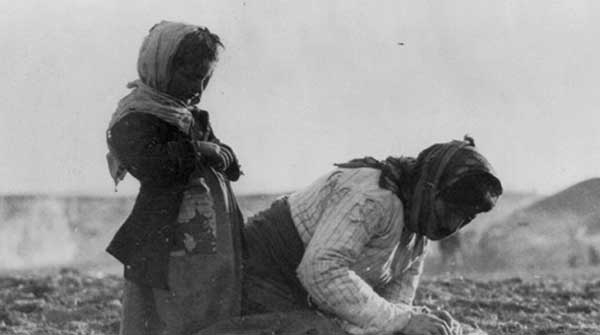Extermination by starvation is clearly Azerbaijan’s first weapon of choice for cleansing Artsakh of its Armenian population
 In the pre-dawn hours of yet another tranquil Ottawa morning – Sept. 19 – my cell phone buzzed. With a sense of foreboding and apprehension, I speed-read the message that popped up.
In the pre-dawn hours of yet another tranquil Ottawa morning – Sept. 19 – my cell phone buzzed. With a sense of foreboding and apprehension, I speed-read the message that popped up.
“Azerbaijan is hitting Artsakh (as Nagorno-Karabakh is known in Armenian). It’s war again. Artillery in the capital (Stepanakert). Calls for Armenia to join. If war starts here too, it’s the end of Armenia. We are surrounded by enemies that are hundreds, if not thousands of times stronger than Armenia.”
Silent words on a small screen, but I could hear my Armenian friend’s panic-stricken voice from the countryside outside Yerevan, the country’s capital, echoing across the ocean and reverberating over the South Caucus mountains.
The notes of anguish and fear of impending doom seemed eerily audible in his panic-stricken message, like a piercing shriek that shattered the silence of that Ottawa morning.
 |
| Related Stories |
| The invisible genocide of Armenians in Artsakh
|
| World stands by in the face of the Second Armenian Genocide
|
| Genocide denied is genocide repeated
|
Media reports confirmed the staccato sentences on my digital device.
Claiming it was an “anti-terrorism operation,” Azerbaijan had begun pounding Artsakh, with its majority Armenian population, with heavy artillery and drone strikes, shelling military and civilian targets and securing strategic mountain passes.
Like my friend, who broke the news to me, I was momentarily numb with shock.
This was despite the fact that as a journalist with an eye on Christian persecution around the world, I had followed the Artsakh story closely. I had reported on what several human rights watchdogs and senior ICC prosecutor Luis Moreno Ocampo had confirmed as an unfolding genocide against Christian Armenians orchestrated by Azerbaijan and its allies.
The military assault had been hanging like a Damocles sword over the 120,000 Christian Armenians of Artsakh, who had been first subjected to a brutal nine-month-long blockade imposed by Azerbaijan. This was achieved by blocking the Lachin Corridor, the six-km mountain highway, land-locked Artsakh’s only supply route to food, medicine and life-sustaining supplies, all of which have to be imported from Armenia.
Extermination by starvation was clearly Azerbaijan’s first weapon of choice for cleansing the region of its Armenian population.
By Sept. 20, Azerbaijan’s military assault brought the starving people of Artsakh to their knees, and a ceasefire was declared on terms that spelled doom for the Armenian population.
Azerbaijani President Ilham Aliyev said Baku had restored its sovereignty (over Artsakh) “with an iron fist” in a 24-hour offensive.
It was mission accomplished for Azerbaijan, but for thousands of Artsakh Armenians, it was farewell to their ancient homeland, leaving behind their possessions, their ancient churches and monasteries and the graves of their loved ones who had fallen in battle.
Thousands are crowding the airport in Stepanakert, fleeing in terror before the “iron fist” strikes again.
“Tragic and barbaric,” another Canadian Armenian friend texted me from Yerevan.
It was indeed a catastrophe on par with two global tragedies of the last nine years. The first was the fall of Mosul on June 10, 2014, to ISIS (Islamic State of Iraq and Syria) after the extremist organization had unleashed a genocidal campaign against Assyrian/Chaldean/Syriac Christians. Two hundred thousand fled their ancient homeland in a panic-stricken exodus, leaving Mosul empty of Christians for the first time in two millennia.
The second was the fall of Kabul to the Taliban on Aug. 15, 2021, which launched a reign of terror for the Afghan population in general, but particularly for women and religious minorities such as Christians and Shia Muslims.
Betrayal in one form or another by Western powers is the common theme that runs through these epic tragedies.
Platitudes and statements of concern, accompanied by appeals to Azerbaijan and Armenia, two countries of vastly unequal military strength to settle their differences “peacefully,” proved to be the most ineffective strategies to counter Azerbaijan’s aggression. Indifference and lack of any decisive action to end the barbaric blockade that isolated, trapped and starved Artsakh residents for nine months was another fatal blow that led to the current humanitarian crisis and political imbroglio.
Perhaps the ultimate irony and most glaring example of Canada’s and the world’s blindness to the ongoing tragedy was the statement issued by Prime Minister Justin Trudeau on Sept. 21, the date of Armenia’s 32nd anniversary of independence from Soviet rule.
“Today, we join Armenian communities in Canada and around the world to celebrate the 32nd anniversary of Armenia’s independence.
“The recent military actions in Nagorno-Karabakh exemplify the need for commitments and measures to stabilize the situation in the South Caucasus and encourage continued progress in the dialogue for durable peace in the region.
“The Canada-Armenia relationship is rooted in warm ties between our peoples. Almost 70,000 Canadians of Armenian descent call Canada home, and they are tightly woven into our national fabric.
“On behalf of the Government of Canada, I extend my best wishes to everyone celebrating Armenia’s Independence Day.”
Too late, Mr. Trudeau! Armenians are in no mood to celebrate.
Now their most urgent need is humanitarian assistance, not best wishes and pious platitudes about “dialogue for durable peace.”
Susan Korah is an Ottawa-based journalist. This article was submitted by The Catholic Register.
For interview requests, click here.
The opinions expressed by our columnists and contributors are theirs alone and do not inherently or expressly reflect the views of our publication.
© Troy Media
Troy Media is an editorial content provider to media outlets and its own hosted community news outlets across Canada.


